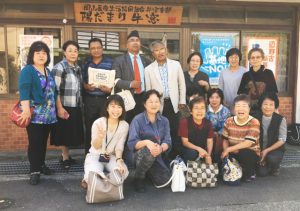Employee benefits are a major deal in Japan given the fierce competition for talent. Japanese candidates tend to be picky when it comes to choosing a company to work for.
It is advised that new market entrants seeking their first hires to invest more in benefit packages and their brand building to help attract and secure talent.
In Japan, employees are expected to work hard and demonstrate strong loyalty and devotion to the firm, in exchange for some degree of job security and benefits, such as housing subsidies, good insurance, the use of recreation facilities, and bonuses and pensions.
Wages begin low, but seniority is rewarded, with promotions based on a combination of seniority and ability.
Leadership is not based on assertiveness or quick decision making but on the ability to create consensus, taking into account the needs of subordinates.
Surveys indicate continued preference for bosses who are demanding but show concern for workers’ private lives over less-demanding bosses interested only in performance on the job.
This system rewards behaviour demonstrating identification with the team effort, indicated by singing the company song, not taking all of one’s vacation days, and sharing credit for accomplishments with the work group.
Pride in one’s work is expressed through competition with other parallel sections in the company and between one’s company and other companies in similar lines of business.
Thus, individuals are motivated to maintain wa (harmony) and participate in group activities, not only on the job but also in after-hours socialising (nomikai).
The image of group loyalty, however, may be more a matter of ideology than practice, especially for people who do not make it to the top.
As a good rule of thumb, the larger the company, the more employee benefits there are, but the lower the base wage will be. Big companies are big on benefits, security and creature comforts but low on base wages. Small venture companies usually have to pay higher base wages and performance incentives, but provide little security and few creature comforts. It’s a trade-off either way.
Paid Leave:
Permanent and contract employees are entitled to a minimum of 10 days paid leave per annum after six months rising to 20 days with more than six-and-a-half years’ of service. This allowance can be pro-rated for partial years worked.
Compared to the UK this may sound like a very small amount of leave, but there are also no fewer than 15 days of public holidays in Japan every year, plus many companies shut down for a statutory period of several days in the summer or during the New Year.
Sick Leave:
In general, there is no sick leave rights in Japan. When employees get sick they use their paid vacation to take leave of absence. Some foreign companies grant sick leave to their employees as a special benefit.
Social Security:
There are two main types of social security:
1. “Kokumin kenko hoken” or “Citizens’ health insurance”
This is mainly aimed at self-employed people, or long-term temporary or part-time workers (called “freeters” in Japan). It is a system whereby the individual registers at his or her local government office and pays a monthly insurance premium, which is assessed according to income.
This insurance covers 70% of the cost of any health treatment. Many people also take out top-up insurance privately to cover the other 30% of costs, just in case of a major illness or injury. Kokumin kenko hoken is substantially cheaper for the individual than the following option (below), as it only covers health insurance, nothing else. As such, it is the preferred option for many foreigners living in Japan who don’t intend to be here for the long term.
2. “Shakai Hoken” or “Social Security”
This is a much more comprehensive plan than the above, and is a contributory system, whereby 50% of the cost of monthly premiums is covered by the individual through deductions from salary at source (just like NHS contributions in the UK) and 50% by their employer. Companies with more than just a handful of employees are obliged to provide this cover to their employees.
Shakai Hoken covers 4 things: Health insurance, industrial injuries insurance, unemployment insurance and pension benefit. With such comprehensive cover, cost to the employee is typically double, or higher than the health insurance at 1) above. Short term foreign workers – expats who will only be in Japan for a couple of years – usually try to avoid being registered for Social Security, and opt for 1) above, or take out insurance provided by a foreign provider as it would be considerably cheaper to do so. Also, unless they work in Japan for 20 years or more, they will never get to claim the pension benefit part of their Social Security payments.
Commutation Expense:
Companies typically refund commutation expenses based on the monthly train fare although it is not an obligation. Please note that commutation expenses are subject to Social Insurance and Labor Insurance but not to employee income tax.
Business Expenses:
Business related expenses are fully reimbursed to employees (travel , meals, lodging).
Expenses non related to work usually have to be included in salary and are subject to taxation. Example: sport club membership,
Expenses refunds are typically not included in the payroll slip.
Overtime Pay:
If an employee works over 40 hours a week then the company is expected to pay for overtime to the employee unless they work in Management position.
Companies that intend to use overtime on a regular basis should put in place a written agreement between employees and management commonly called “article 36″ and submit it to Labour Standards Inspection Office.
This agreement is often called “Article 36″ because it refers to Article 36 of the Japanese Labour Law. This report should be renewed every year.
Short Term Leave / Long Term Leave
Short Term leave and Long Term leave are not regulated by Labor law. It is a matter of agreement between the company and the employee. Usually employees can take unpaid short leave.
Maternity Leave
Guaranteed maternity leave in Japan covers a period of 6 weeks prior to the expected birth date to 8 weeks after giving birth. Employee may return to work earlier after getting approval by a medical doctor.
Child Care Leave
Child care leave applies to both female and male employees.
Child care leave starts from the day after the maternity leave ends (i.e. 8 weeks after the birth date), to the day before the child reaches the age of 1.
If the employee’s spouse is also on child care leave, the child care leave may be extended up to when the child reaches the age of 1 year and 2 months. The duration each parent may take child care leave should not, however, exceed one year.
Compensation during Maternity Leave
During maternity leave, the employee salary will be covered by the social insurance up to a limit of around 2/3 of the base salary.
If the company decides to make a certain amount of payment during this period, the amount covered by the social insurance office will be reduced.
i.e. payment by company during maternity leave plus amount covered by social insurance will not exceed 2/3 of the base salary
Compensation during Child Care Leave
During child care leave, payment will be covered by the labor insurance.
The company may contribute a certain amount of payment during this period.
The total amount, however, should not exceed 2/3 of the base salary.
Additional Paid Day Leave that are Usually Granted by the Company
1) Leave due to death in the family
a) Death of a father, mother, spouse, or child: up to five days
In this case the number of days required for a round trip can be considered as leave; other days may be provided in addition to the number of days indicated above.
b) Death of a grandparent, grandchild, sibling, child’s spouse, or spouse’s parent: up to three days.
In the event of (a) or (b), when an employee is the chief mourner, meaning the person in charge of arranging the funeral service, an additional two leave days are added.
2) Leave to attend Buddhist memorial services
For the first year memorial service of a deceased parent, spouse or child: one day
3) Leave for marriage
When an employee marries: five days
5) Leave for jury service
When an employee is elected as a juror and must appear in court: the approved number of days.
6) Public work leave
When an employee carries out public office duties: the approved number of days
This information is for illustration purpose only as may change at any time without notice. We cannot be held liable for any decision made based on this information.


